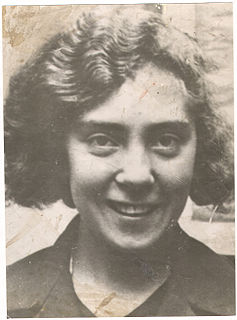 W
WTosia Altman was a courier and smuggler for Hashomer Hatzair and the Jewish Combat Organization (ŻOB) during the German occupation of Poland and the Warsaw Ghetto Uprising.
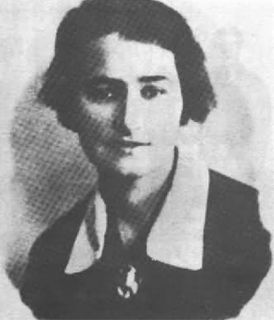 W
WJadwiga Falkowska codename: Jaga, Zdzisława, Ludwika, Zaleska was a Polish teacher, social activist, Scoutmaster (harcmistrzyni) and one of the founders of Girl Scouting in Poland.
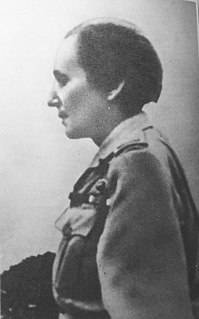 W
WMajor Wanda Gertz was a Polish woman of noble birth, who began her military career in the Polish Legion during World War I, dressed as a man, under the pseudonym of "Kazimierz 'Kazik' Żuchowicz". She subsequently served in the Ochotnicza Legia Kobiet of the Polish Armed Forces during the Polish–Soviet War. In the interwar period she became a reserve officer but faced discrimination and was stripped of her officer rank. She worked closely with Marshal Piłsudski and remained an activist in the cause of women in the military.
 W
WIrena Morzycka-Iłłakowicz was a Polish second Lieutenant of the National Armed Forces and intelligence agent. The daughter of Bolesław Morzycki and Władysława Zakrzewska and the sister of Jerzy, she was also a polyglot who spoke seven languages: Polish, French, English, Persian, Finnish, German and Russian.
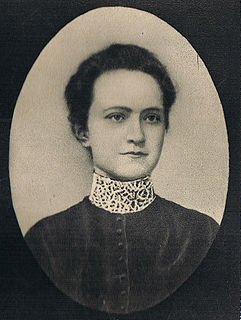 W
WWanda Krahelska-Filipowicz, code name “Alinka”” or “Alicja”, was a leading figure in Warsaw’s underground resistance movement throughout the years of German occupation during World War II in Poland, co-founder of Żegota. As the well-connected wife of a former ambassador to Washington, she used her contacts with both the military and political leadership of the Polish Underground to materially influence the underground's policy of aiding Poland's Jewish population during the war.
 W
WHalina Krahelska was a Polish activist, publicist and writer.
 W
WCountess Karolina Maria Adelajda Franciszka Ksawera Małgorzata Edina Lanckorońska was a Polish noble, World War II resistance fighter, philanthropist, and historian.
 W
WZivia Lubetkin was one of the leaders of the Jewish underground in Nazi-occupied Warsaw and the only woman on the High Command of the resistance group Żydowska Organizacja Bojowa (ŻOB). She survived the Holocaust in German-occupied Poland and immigrated to Mandate Palestine in 1946, at the age of 32.
 W
WEmilia Malessa, née Izdebska, was a Polish soldier, member of the Home Army with the rank of Captain, participant in the Warsaw Uprising, member of the underground anti-communist organization Freedom and Independence (WiN), and a "cavalier" of the Order of Virtuti Militari.
 W
WOlimpia Obarska-Forkasiewicz, better known by her stage name Ola Obarska, was a Polish actress, operetta singer, librettist, theatre director, journalist and songwriter.
 W
WAleksandra Piłsudska, née Szczerbińska, was the second wife of Józef Piłsudski.
 W
WJadwiga Piłsudska-Jaraczewska was a Polish pilot, who served in the Air Transport Auxiliary during the Second World War. She was one of two daughters of Józef Piłsudski.
 W
WMaria Piotrowiczowa, a January insurgent, participant of the battle of Dobra, born in 1839, killed on 24 February 1863.
 W
WCountess Emilia Plater was a Polish–Lithuanian noblewoman and revolutionary from the lands of the partitioned Polish–Lithuanian Commonwealth. Raised in a patriotic tradition in Līksna near Daugavpils, she fought in the November Uprising of 1830–1831 against the Russian Empire. She raised a small unit, participated in several engagements in present-day Lithuania, and received the rank of captain in the Polish insurgent forces. When the main forces under the General Dezydery Chłapowski decided to cease fighting and cross into Prussia, Plater vowed to continue the fight and wanted to cross into Poland where the uprising was still ongoing. However, she fell ill and died.
 W
WPrzysposobienie Wojskowe Kobiet was a Polish organization for women, which existed in the interbellum period as well as during World War II. This was not a paramilitary organisation.
 W
WAnna Henryka Pustowójtówna was a Polish activist and soldier, famed for her participation in the January Uprising.
 W
WZofia Romanowiczowa was a Polish writer and translator.
 W
WDanuta Helena Siedzikówna was a Polish medical orderly in the 4th Squadron of the 5th Wilno Brigade in Home Army. In 1946 she served with the Brigade's 1st Squadron in Poland's Pomerania region. Considered a national heroine, she was captured, tortured and sentenced to death at the age of 17 by the communist authorities.
 W
WEugenia Umińska was a Polish violinist.
 W
WVoluntary Legion of Women was a voluntary Polish paramilitary organization, created by women in Lviv in late 1918. At that time possession of the city was contested by the Poles and Ukrainians, and women decided to assist the Polish soldiers in all possible ways, including fighting on the front line.
 W
WHalszka Wasilewska, sometimes called Halina,, WW2 nom-de-guerre Krystyna, was one of the first women to attain the rank of Major in the Polish Armed Forces. She was a Legionnaire in the First world war and the subsequent Polish-Soviet War in 1920. She participated in the battle for Lwów and in the Polish - Ukrainian War. As an officer, she had special responsibility for training in the women's Polish Armed Forces during the interbellum. With the outbreak of WW2, she directed training for the women in the Polish Underground Army. She was captured and tortured by the Nazis and held in Ravensbrück concentration camp for two years. After liberation she rose to the rank of Major of the Women's forces in General Maczek's 1st Armoured Division in post-war Germany. She was the elder sister of the deeply controversial communist activist, Wanda Wasilewska who has overshadowed her in history.
 W
WMaria Wittek, Poland. She served in the Polish Army and associated organizations from the age of 18 and, following her retirement, became the first Polish woman to be promoted to Brigadier-General in 1991.
 W
WAnna Zakrzewska served with the Polish underground army as a courier and a medical orderly. She was killed in the course of desperate combat during the Warsaw Uprising.
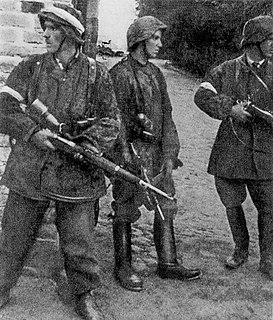 W
WElżbieta Zawacka, known also by her war-time nom de guerre Zo, was a Polish university professor, scouting instructor, SOE agent and a freedom fighter during World War II. She was also a Brigadier General of the Polish Army, promoted by President Lech Kaczyński on 3 May 2006. The only woman among the Cichociemni, she served as a courier for the Home Army, carrying letters and other documents from Nazi-occupied Poland to the Polish government in exile and back. Her regular route ran from Warsaw through Berlin and Sweden to London. She was also responsible for organizing routes for other couriers of the Home Army.